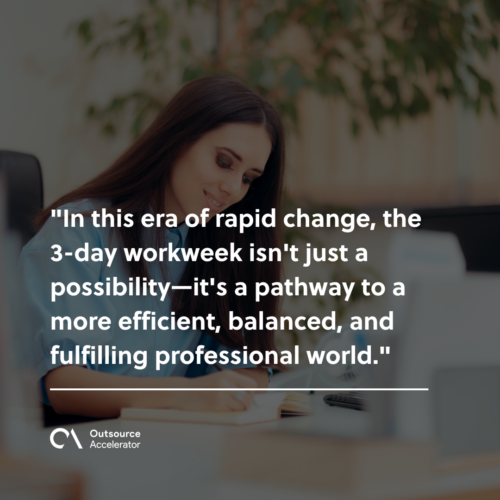Work less, do more
The traditional Monday-to-Friday schedule is dead.
Between globalization and rapidly-evolving technological advancements, working a full 5-day week is lunacy, something that should be confined to the Room 101 of business.
Thankfully, there is a better way of working.
The refinement of productivity
We have an obsession with days and hours.
The 4-day week. The 4hr workweek. The 4hr life.
Well here’s a new one for you to consider – what about the 3-day workweek?
I’ve spoken about this before, as have such luminaries as Richard Branson, and now it seems that even Bill Gates has caught up with the idea.
By adopting a flexible approach to work schedules, employees can work fewer hours while maintaining, or even enhancing, their effectiveness.
Working smarter, not longer
We’re all familiar with Parkinson’s Law, right? The concept of work expanding to fill the time allotted for it.
The “magic of the imminent deadline”, as Tim Ferriss calls it.
Report due one week from now? You’ll get it in a week. Report due tomorrow? Best get on it now.
By trimming down to a 3-day week, employees will adapt accordingly. Fluff will be trimmed and unnecessary meetings culled from calendars.
Employees become more adept at identifying and tackling the most critical tasks first, ensuring that productivity levels remain high despite the shorter time frame.

Giving your team a (longer) break
Additionally, a 3-day work week provides greater opportunities for employees to rest and recharge.
104 days off a year becomes 208, meaning more time for family, friends, hobbies, and relaxing.
This leads to improved mental health, reduced stress, and higher engagement while working.
Energy levels no longer wane as the week drags on.
The result?
Skyrocketing productivity and employee satisfaction, ensuring that targets are met, and (more importantly) talent is retained.
Split shifts, total coverage
Of course, some adaptability will be required.
Days off can be staggered amongst your team to ensure there is no interruption to service.
Thankfully, with the increased accessibility afforded by outsourcing and remote workers, any potential gaps in schedule can be effectively without breaking the bank, ensuring round-the-clock customer service regardless of time zone.
And any company promising an extra couple of days R&R suddenly becomes very attractive to top tier talent.
A duty to adapt
As employers, it’s crucial to consider innovative work models in the context of evolving business landscapes.
A three-day workweek offers a promising blend of heightened productivity and improved employee well-being.
It’s a bold step, but one that could redefine the future of work.
In this era of rapid change, the 3-day workweek isn’t just a possibility—it’s a pathway to a more efficient, balanced, and fulfilling professional world.

The question for your business
Is it time to rethink the Monday-Friday paradigm?

 Independent
Independent





















